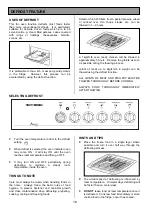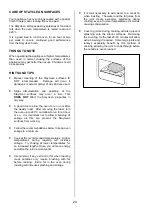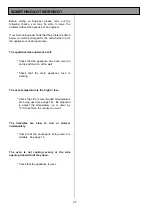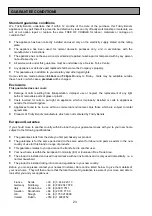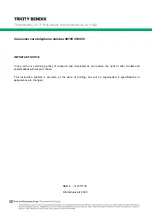
20
CARE OF STAYCLEAN SURFACES
Your appliance has oven linings coated with a special
finish to help make cleaning the oven easier.
The Stayclean surfaces destroy splashes of food and
fats when the oven temperature is raised to around
220°c.
It is a good idea to run the oven for an hour or two
per week to ensure continued good performance
from the Stayclean finish.
THINGS TO NOTE
When operating the appliance at higher temperatures
than used in normal cooking the surfaces of the
appliance may get hotter than usual. Children should
be kept away.
HINTS AND TIPS
·
Manual cleaning of the Stayclean surfaces IS
NOT recommended. Damage will occur if
abrasives or aerosol sprays of any kind are used.
·
Slight discolouration and polishing of the
Stayclean surfaces may occur in time. This
DOES
NOT
affect the Stayclean properties in
any way.
·
A good time to allow the oven to run on is after
the weekly roast. After removing the roast, turn
the oven up to 220°C and allow to run for an hour
or so. It is important not to allow a build-up of
soilage as this can prevent the Stayclean
surfaces from working.
·
Follow the recommendations below to keep oven
soilage to a minimum.
·
Cook at the recommended temperatures. Higher
temperatures during roasting will increase
soilage. Try cooking at lower temperatures for
an increased length of time, you will save energy
and often the joint is more tender.
·
Use minimal, if any, extra oil or fat when roasting
meat, potatoes only require brushing with fat
before cooking. Extra fat in the oven during
roasting will increase splashing and soilage.
·
It is
not
necessary to add water to a meat tin
when roasting. The water and the fat juices from
the joint create excessive splattering during
cooking, even at normal temperatures, as well as
causing condensation.
·
Covering joints during cooking will also prevent
splashing onto the interior surfaces. Removing
the covering for the last 20-30 minutes will allow
extra browning if required. Some large joints and
turkeys especially benefit by this method of
cooking, allowing the joint to cook through before
the outside is over-browned.













